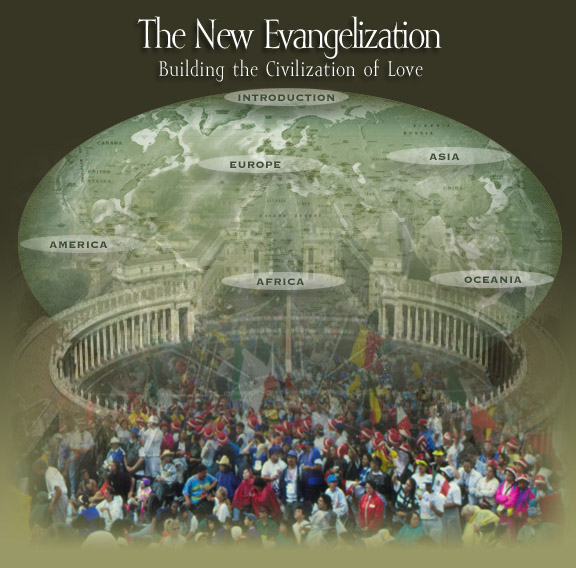Best practices in educating adults in ways of the faith
Catechetical challenges
Building relationships
Lifelong process
Your answer
Lifelong formation is key in spreading Good News among youngsters and other adults, catechists say
By Michelle Martin
OSV Newsweekly
3/25/2012
“Disciples young and old are called by name to go into the vineyard. In responding to this call, adults ‘have the greatest responsibilities and the capacity to live the Christian message in its fully developed form.’ Their formation in faith is essential for the Church to carry out its mandate to proclaim the Good News of Jesus to the world. Effective adult formation is necessary to ‘equip the holy ones for the work of ministry’ (Eph 4:12).”
—Our Hearts Were Burning Within Us, 1999

With the Catholic Church’s emphasis on the New Evangelization and the upcoming Year of Faith, Catholics must be ready to share their faith. To do that, they must not only know and understand what the church teaches, they must have a personal and growing relationship with Jesus Christ.
That means there is a greater need than ever for efforts to help form adults in their faith, whether they are new or returning Catholics who have never been well-catechized in the first place or whether they are lifelong practicing Catholics, said Maryanne Harrington, director of the Office for Formation of the Laity for the Archdiocese of Philadelphia.
The Church has been talking explicitly about adult faith formation at least since the 1970s, Harrington said, but its roots go all the way to when Jesus first walked the earth.
“Who did Jesus teach?” Harrington asked. “He played with the children. He blessed the children. But he talked to, he taught the adults. He expected them to teach the children.”
Catechetical challenges
The U.S. bishops placed adult faith formation squarely in the center of all the Church’s catechetical efforts in “Our Hearts Were Burning Within Us,” the document on catechesis released in 1999.
Further reading
To learn more about adult faith formation and how it relates to the New Evangelization, look for the following resources:
Redemptoris Missio: 1990 encyclical by Pope John Paul II on the permanent validity of the Church’s missionary mandate.
Go and Make Disciples: A National Plan and Strategy for Catholic Evangelization in the United States, published by the U.S. Conference of Catholic Bishops in 1992.
Our Hearts Were Burning Within Us: A Pastoral Plan for Adult Faith Formation in the United States, published by the U.S. Conference of Catholic Bishops in 1999
Porta Fidei for the Indiction of the Year of Faith: Apostolic Letter of Pope Benedict XVI, Oct. 11, 2011.
Teaching adults, however, isn’t always easy. Adults have a lifetime of their own experiences and thoughts, and they need to be able to relate what they learn about Christ and his church to their own lives if they are to be transformed by it.
“You have to connect it to what’s going on in their lives,” she said. “You have to allow plenty of time for reflection so they can make those connections. How does this change me? How does that affect my life?”
Father Geno Sylva, vicar for evangelization in the Diocese of Paterson, N.J., and director of St.-Paul-Inside-the-Walls, the diocese’s center for evangelization, said the diocese chose to focus on forming adults in their faith for two basic reasons.
First, if the Church does not catechize people in their 20s, 30s and 40s, they will not be able to pass the faith on to their children, or even reinforce what their children learn in religious education programs. “We don’t want to lose another generation of children,” he told Our Sunday Visitor.
Second, the center wants to help those same adults feel at home in the Church.
Doing that means approaching them in multiple ways, Father Sylva said. First, there is the intellectual, theological, philosophical level, hearing the questions people have about Church teaching and answering them clearly and honestly. Once people know the Church on an intellectual level, they can come to know Christ on a spiritual level.
“A good number of those who claim to be Catholic do not practice the faith,” Father Sylva said. “We have to continue to not be afraid to call people in love to conversion to Christ.”
Building relationships
To do that, Father Sylva and Father Derek Anderson, the director of catechesis as evangelization for the Diocese of Paterson, meet people where they are, having groups of Catholic lawyers, for example, create events that will draw more Catholic lawyers, hosting programs for people suffering from addictions or going to area university campuses for question-and-answer sessions about Catholicism.
Then they engage in what Father Anderson calls a process of “pre-evangelization,” to help people be open to the message of salvation.
“They have to be able to take it in,” he said.
Once the process of formation begins, the most important thing to remember is that it’s about building a relationship with Jesus Christ, not just about imparting information.
“If you’re just doing education, you’re not doing formation,” Harrington said.
Encouraging Catholics to practice their faith and offering opportunities to understanding its teachings helps them fall more in love with Christ, Father Sylva said.
That’s why, for example, the program for people with addictions at St. Paul-Inside-the-Walls includes a regular Mass. Not everyone participates, but many who would not otherwise go to Mass do.
“Boom, you connect them to the sacraments,” Father Sylva said. “Those women and men are coming from all over New Jersey.”
Lifelong process
Even those who regularly practice their faith can use more opportunities to grow in their understanding and in their relationship with Jesus, Harrington said.
She suggests that all of the parish coordinators of Adult Faith Formation ask that each group in the parish — the lectors, the ushers, the altar and rosary societies — devote a portion of each meeting to learning something about their faith and reflecting on it.
Formation is not a one-time experience that comes to an end, she said. Like any long-term relationship, a Catholic’s relationship with Jesus will only flourish with continued effort and learning.
Once adults are participating in catechesis, Father Sylva said, don’t treat them like children. Make sure the people who are coming feel respected.
“Evangelization has to make sure it listens, it understands and then it speaks,” he said.
At programs presented at St. Paul-Inside-Walls, “we try to make it so it’s not just a dry discussion about God,” he said. “It’s supposed to reach them and connect them to Christ.”
For those just starting the process, that means starting at the beginning, said Father Anderson.
“We know we can’t assume that people have been catechized, so we start with some of the main tenets of Catholic teaching,” he said. “We talk about why we believe what we believe. What is truth? Is truth knowable? Can we know it with certainty?”
People need an opportunity to ask questions and express opinions, Father Sylva said.
“In a lot of the questions, you do sense a level of conflict or hurt,” he said. “They’ve heard wrong teaching or responded to wrong teaching.”
People need to feel comfortable coming as they are, he said, so they feel a sense of belonging, a sense that they are home. But they can’t feel so comfortable that they don’t want to change a thing.
“You have to balance a sense of belonging with a call to conversion,” he said.
That conversion doesn’t end, Harrington said. It’s an ongoing process in which the person who is evangelized and formed goes on to become an evangelizer — as is called for in the New Evangelization. But in the process of evangelizing, they continue to be evangelized and formed themselves, growing in their relationship with Christ.
“We’re called to be constantly forming ourselves to Christ,” she said.
Your answer
Does your parish offer any adult faith formation classes?
Yes
No
I don't know
Do something
..

